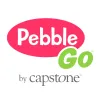Take a look inside 9 images
PebbleGo
Pros: The wide variety of topics and consistent format let kids practice researching and reporting, with proper citations, what they learn.
Cons: Teachers can see the most popular articles, but there's no way to know how individual students are engaging with the material.
Bottom Line: Delightful, safe introduction to the world of research, databases, and reporting, with interesting content and stellar supports.
In general, teachers can use PebbleGo's databases to teach kids about research, reporting, and citing sources. For beginning researchers, give students a chance to explore topics according to their interests and come up with two to three fun facts to share with their classmates. As their skills mature, challenge kids to use the biography database to research three people they've never heard of, and play a guessing game with the facts they submit. Older kids can also explore PebbleGo Next. For a more structured activity, have each student complete one of the report templates available on the site; put the reports together to create a reference wall for your current unit of study.
Check out the content maps to see what topics are available. Students can do research on their own or in small groups, in the classroom or at home. Younger kids might benefit from more guided searches and specific assignments, while older students might enjoy more freedom to search according to their own interests. Kids can also share their reflections on their research process and contribute to a class list of "pro tips" for using the site. Helping students develop effective research skills can be overwhelming, but PebbleGo's colorful design, easily navigable topics, and just-right amount of information make the process less daunting for teachers and learners alike.
PebbleGo is a kid-friendly, searchable database that covers a variety of research topics and can be available in both English and Spanish. Five main modules -- animals, science, biographies, social studies, and health -- are divided into topics and subtopics. For example, students can narrow their biography search to explorers or their animal search to animal behavior. Every subtopic presents a five-part report with text, photos, media, links to similar topics, printable assessment sheets, and a correct citation. As kids navigate across the images, they'll hear the topic described. Each module also includes some simple games, an article of the day, a search field, and a question of the day related to article topics. For example, in the science database, there's a poll titled "What is your weather today?" Every article has a "copy link" button to help facilitate sharing; kids can use the link to access the article without needing to log in.
Kids can read on their own or choose to have text highlighted and read to them. The modulated speech can help students improve reading fluency, but since students can't change the speed, some might find it too slow or too fast. Teacher resources on the administrative side include comprehensive lesson plans, printable activity sheets, and some basic overall usage statistics that include login frequency and popular articles. The base subscription plan includes all the articles in English. Subsequent subscription levels can include up to three add-ons: Spanish language collection, PebbleGo Next (for grades 3–5), and PebbleGo Read More (additional related resources to supplement learning).
To see how this tool works, watch our video overview of PebbleGo.
PebbleGo is a wonderful, fun introduction to the world of database research, where students can search, learn, and explore in a safe, kid-friendly environment. The topics vary enough that most kids will find something of interest, and the multiple modes of presentation such as text, read-aloud, images, and videos make it all easily accessible. Kids don't log on with individual accounts, and while this helps keep the site safe and private, it also means that there's no way to assess learning online or track kids' search paths. Teachers can use the printable assessment sheets to gauge what kids are learning, and the blog offers lots of creative ideas to make research engaging.
Giving kids practice conducting research and then reporting on it is an important exercise; it's something they'll certainly do a lot in their academic lives. Younger kids, though, will likely need lots of scaffolding from teachers. The games, while engaging, may not do much to spark critical thinking. They seem more likely to keep kids occupied with related educational material than to immerse them in embedded research skills. And teaching kids how to do targeted and efficient internet searches is still critical. Taken as a whole, however, the intuitive user interface and wealth of standards-based content make PebbleGo a stellar engagement tool for foundational research skills.


















